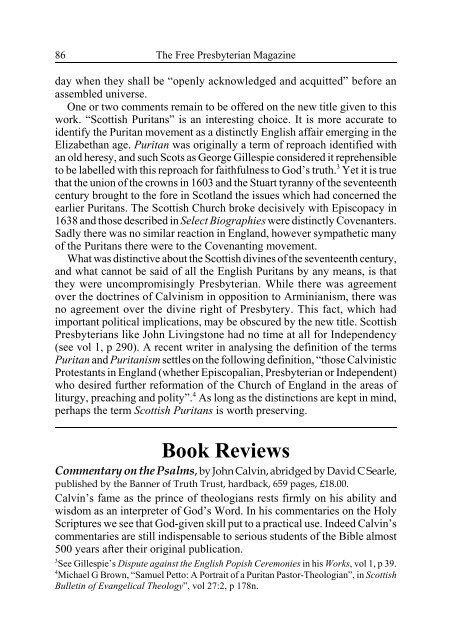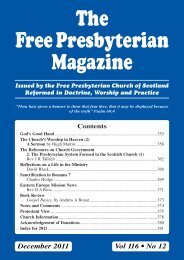March - the Free Presbyterian church of Scotland
March - the Free Presbyterian church of Scotland
March - the Free Presbyterian church of Scotland
Create successful ePaper yourself
Turn your PDF publications into a flip-book with our unique Google optimized e-Paper software.
86The <strong>Free</strong> <strong>Presbyterian</strong> Magazineday when <strong>the</strong>y shall be “openly acknowledged and acquitted” before anassembled universe.One or two comments remain to be <strong>of</strong>fered on <strong>the</strong> new title given to thiswork. “Scottish Puritans” is an interesting choice. It is more accurate toidentify <strong>the</strong> Puritan movement as a distinctly English affair emerging in <strong>the</strong>Elizabethan age. Puritan was originally a term <strong>of</strong> reproach identified withan old heresy, and such Scots as George Gillespie considered it reprehensibleto be labelled with this reproach for faithfulness to God’s truth. 3 Yet it is truethat <strong>the</strong> union <strong>of</strong> <strong>the</strong> crowns in 1603 and <strong>the</strong> Stuart tyranny <strong>of</strong> <strong>the</strong> seventeenthcentury brought to <strong>the</strong> fore in <strong>Scotland</strong> <strong>the</strong> issues which had concerned <strong>the</strong>earlier Puritans. The Scottish Church broke decisively with Episcopacy in1638 and those described in Select Biographies were distinctly Covenanters.Sadly <strong>the</strong>re was no similar reaction in England, however sympa<strong>the</strong>tic many<strong>of</strong> <strong>the</strong> Puritans <strong>the</strong>re were to <strong>the</strong> Covenanting movement.What was distinctive about <strong>the</strong> Scottish divines <strong>of</strong> <strong>the</strong> seventeenth century,and what cannot be said <strong>of</strong> all <strong>the</strong> English Puritans by any means, is that<strong>the</strong>y were uncompromisingly <strong>Presbyterian</strong>. While <strong>the</strong>re was agreementover <strong>the</strong> doctrines <strong>of</strong> Calvinism in opposition to Arminianism, <strong>the</strong>re wasno agreement over <strong>the</strong> divine right <strong>of</strong> Presbytery. This fact, which hadimportant political implications, may be obscured by <strong>the</strong> new title. Scottish<strong>Presbyterian</strong>s like John Livingstone had no time at all for Independency(see vol 1, p 290). A recent writer in analysing <strong>the</strong> definition <strong>of</strong> <strong>the</strong> termsPuritan and Puritanism settles on <strong>the</strong> following definition, “those CalvinisticProtestants in England (whe<strong>the</strong>r Episcopalian, <strong>Presbyterian</strong> or Independent)who desired fur<strong>the</strong>r reformation <strong>of</strong> <strong>the</strong> Church <strong>of</strong> England in <strong>the</strong> areas <strong>of</strong>liturgy, preaching and polity”. 4 As long as <strong>the</strong> distinctions are kept in mind,perhaps <strong>the</strong> term Scottish Puritans is worth preserving.Book ReviewsCommentary on <strong>the</strong> Psalms, by John Calvin, abridged by David C Searle,published by <strong>the</strong> Banner <strong>of</strong> Truth Trust, hardback, 659 pages, £18.00.Calvin’s fame as <strong>the</strong> prince <strong>of</strong> <strong>the</strong>ologians rests firmly on his ability andwisdom as an interpreter <strong>of</strong> God’s Word. In his commentaries on <strong>the</strong> HolyScriptures we see that God-given skill put to a practical use. Indeed Calvin’scommentaries are still indispensable to serious students <strong>of</strong> <strong>the</strong> Bible almost500 years after <strong>the</strong>ir original publication.3 See Gillespie’s Dispute against <strong>the</strong> English Popish Ceremonies in his Works, vol 1, p 39.4 Michael G Brown, “Samuel Petto: A Portrait <strong>of</strong> a Puritan Pastor-Theologian”, in ScottishBulletin <strong>of</strong> Evangelical Theology”, vol 27:2, p 178n.
















